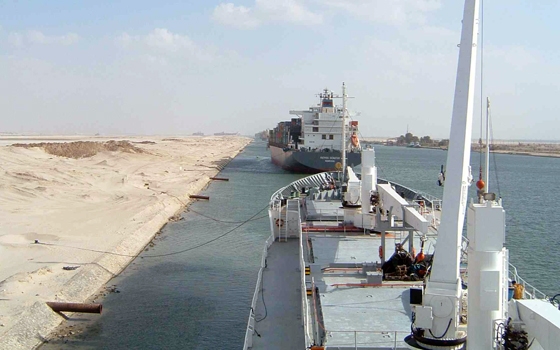Egypt signed contracts with six international firms to carry out dredging of the new Suez canal, the flagship project in President Abdel-Fattah al-Sisi’s program to revive an economy battered by years of political turmoil. The companies are National Marine Dredging Company of the United Arab Emirates; Royal Boskalis Westminster and Van Oord, both based in the Netherlands; Jan de Nul Group and Deme Group, both of Belgium; and U.S.-based Great Lakes Dredge and Dock Company.
Lt. Gen. Mohab Memish, head of the Suez Canal Authority, announced the consortium at a news conference in Cairo alongside Prime Minister Ibrahim Mehleb.
Egypt hopes the new canal will more than double revenues from the waterway by 2023 to $13.5 billion from $5 billion. It also plans to develop 76,000 square kilometers in the area into an international industrial and logistics hub to attract more ships and generate income.
Memish did not provide financial details of the contracts but said the companies would begin working this week. The new canal is scheduled to be completed by August 2015, an ambitious target set by Sisi.
“In order to complete this work within one year it was necessary to make use of huge dredging machines, international dredging machines, because the amount of wet dredging is very large,” Memish said.
Engineers from the army began digging in the area in August when the project was unveiled. Memish said they would conduct dredging in one of the new canal’s six work zones, with the international companies operating in the remaining areas.
He said the overall project would require up to 36 dredgers to remove about 250 million cubic meters worth of material.
Pierre Catteau, an official from Deme Group, said there would be a massive mobilization of equipment from around the world in order to meet the project’s ambitious deadline. “I think we were all surprised at how fast this came on the market, how fast it was tendered and how fast it will be executed,” he told Reuters on the sidelines of the news conference. “But it’s possible and we will put all efforts to make it happen.”
The new canal is to be built alongside the existing 145-year-old waterway which is the fastest shipping route between Europe and Asia. Income from the existing canal provides a vital source of hard currency for a country that has suffered a slump in tourism and foreign investment since the 2011 uprising.
Diplomats at the event included Western ambassadors to Egypt and UAE Minister of State Sultan Ahmad al-Jaber, the UAE’s point man on Egyptian projects.
The UAE, along with Gulf allies Saudi Arabia and Kuwait, has given Egypt billions of dollars in aid since Sisi, then army chief, led the army’s ousting of Muslim Brotherhood president Mohammad Morsi last July following protests against his rule.
William Murchison, an official at Great Lakes, said the technical aspects of the project were straightforward but the challenge was one of scale and time frame.
“One key thing is good about this: the funding is in place. The money is there. We have a motivated employer,” he told Reuters after the event.
Egypt’s central bank governor said last month the state had reached the $8.5 billion funding goal for the project, which it has financed through the issue of investment certificates in the domestic market.
Reuters
21 October

























































